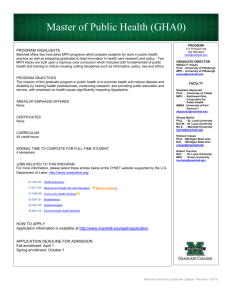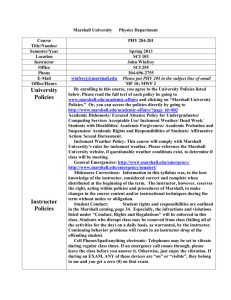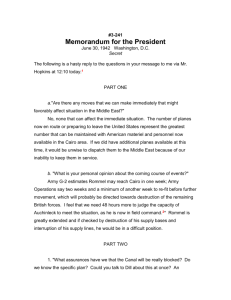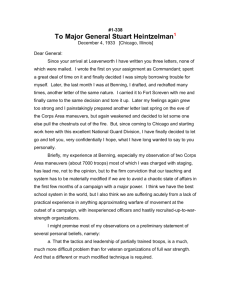1-036 - George C. Marshall Foundation
advertisement
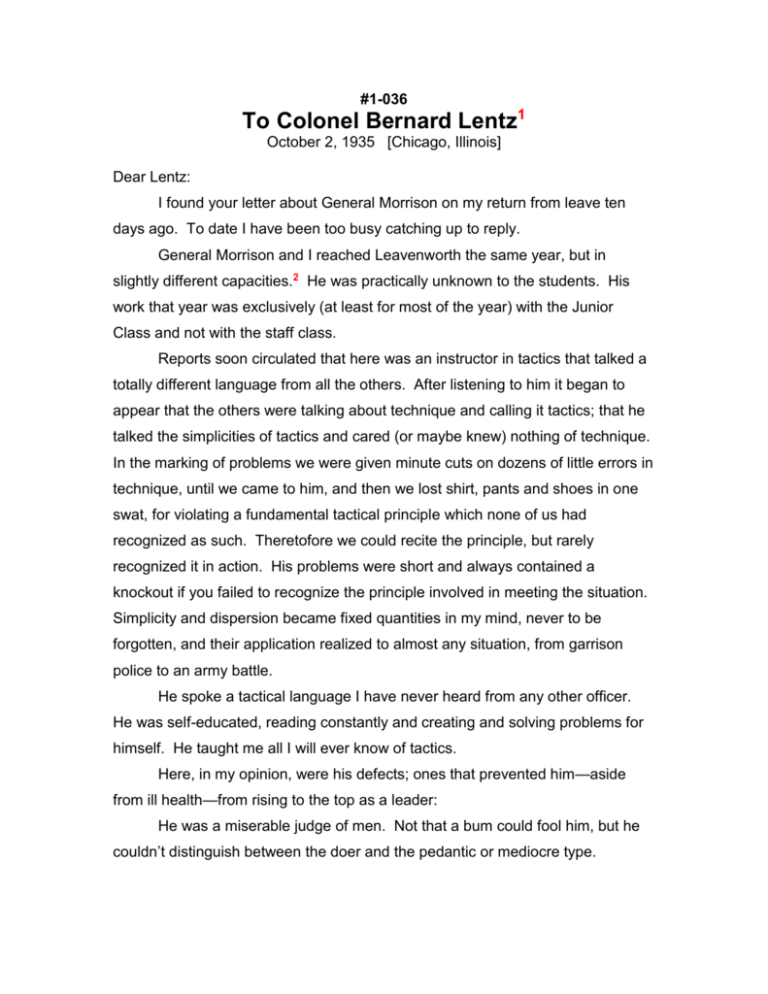
#1-036 To Colonel Bernard Lentz1 October 2, 1935 [Chicago, Illinois] Dear Lentz: I found your letter about General Morrison on my return from leave ten days ago. To date I have been too busy catching up to reply. General Morrison and I reached Leavenworth the same year, but in slightly different capacities.2 He was practically unknown to the students. His work that year was exclusively (at least for most of the year) with the Junior Class and not with the staff class. Reports soon circulated that here was an instructor in tactics that talked a totally different language from all the others. After listening to him it began to appear that the others were talking about technique and calling it tactics; that he talked the simplicities of tactics and cared (or maybe knew) nothing of technique. In the marking of problems we were given minute cuts on dozens of little errors in technique, until we came to him, and then we lost shirt, pants and shoes in one swat, for violating a fundamental tactical principle which none of us had recognized as such. Theretofore we could recite the principle, but rarely recognized it in action. His problems were short and always contained a knockout if you failed to recognize the principle involved in meeting the situation. Simplicity and dispersion became fixed quantities in my mind, never to be forgotten, and their application realized to almost any situation, from garrison police to an army battle. He spoke a tactical language I have never heard from any other officer. He was self-educated, reading constantly and creating and solving problems for himself. He taught me all I will ever know of tactics. Here, in my opinion, were his defects; ones that prevented him—aside from ill health—from rising to the top as a leader: He was a miserable judge of men. Not that a bum could fool him, but he couldn’t distinguish between the doer and the pedantic or mediocre type. He couldn’t hear—or rather concentrate sufficiently to understand—views other than his own. There was no difficulty in tactical matters, but that was because he was so much wiser than all the others that there could be no possible grounds for argument—merely the necessity for further exposition by him. But on other subjects I found he really did not even hear what you were saying, though he was easily approachable and listened—apparently—patiently. He understood nothing of the necessity of compromise. This is a magnificent, but rather unpractical trait. In almost every public position in life compromises must be made. The great man is he who makes the minor adjustments—without dishonor—that permit the great issues or important matters to be carried to proper completion. In General Morrison’s case, this came about through his lack of contacts—too many hours in the library and too few with men. One afternoon at Leavenworth will illustrate something of this. He and I were leaving to play golf. Both of us were terrible. My balls flew off at a tangent and never went down the course (they still do); his topped balls bounced pathetically along the fairway. He invariably remarked “Well, I have good direction." Never, in my memory, did he lift but one ball off the ground, and that struck the saddle horn of a civilian driving cattle near the cemetery. I calmed the cussing man, and General Morrison very sonorously remarked, “My direction wasn’t so good that time." Not a hint of a joke. As we walked home in the dusk, across the West Parade, I suggested that we stop at the Club. He begged off, but I insisted. We really created a sensation as we entered—Joe Louis as my companion could not have been more surprising. I steered Colonel Morrison to a table where E. T. Collins, J. M. A. Palmer, Bjornstad and E. J. Williams were sitting. They welcomed him with honor and delight. Having had a few drinks they continued their badinage. We had a couple of cocktails and General Morrison joined in the laughter about this and that. Finally, he and I started home. It was late, after his dinner hour and he commented on that. Then, after a little silence, he made a remark that stuck in my mind throughout the remainder of his career. “Marshall,” he said, “I don’t mix enough with other officers.”3 The foregoing is probably not what you wanted, but it represents my impressions. However, do not quote me. Faithfully yours Document Copy Text Source: George C. Marshall Papers, Illinois National Guard Collection, George C. Marshall Research Library, Lexington, Virginia. Document Format: Typed letter. 1. Lentz, whom Marshall had known since 1908, was interested in writing a story for the Infantry Journal on John F. Morrison (U.S.M.A., 1881). He had written to Marshall requesting “some anecdotes, wise sayings, etc., that would be helpful in giving our many younger officers something of the spirit of this truly great officer and teacher." (Lentz to Marshall, September 14, 1935, GCMRL/G. C. Marshall Papers [Illinois National Guard].) 2. Morrison, then a major in the Twentieth Infantry, arrived at Fort Leavenworth in September, 1906, to take the position of assistant instructor in the Department of Military Art at the Infantry and Cavalry School and the Staff College. The next year he became the senior instructor and in 1908 the assistant commandant. 3. This incident must have happened during the 1909–10 school year when Marshall was an instructor in the Engineering Department. At that time Captain Edgar T. Collins (U.S.M.A., 1897), sixth Infantry, was a student in the School of the Line, and Captains John McA. Palmer (U.S.M.A.,1892), Fifteenth Infantry; Alfred W. Bjornstad, Twentyeighth Infantry; and Ezekiel J. Williams, Fifth Infantry, were students in the Staff College. Recommended Citation: The Papers of George Catlett Marshall, ed. Larry I. Bland and Sharon Ritenour Stevens (Lexington, Va.: The George C. Marshall Foundation, 1981– ). Electronic version based on The Papers of George Catlett Marshall, vol. 1, “The Soldierly Spirit,” December 1880-June 1939 (Baltimore and London: The Johns Hopkins University Press, 1981), pp. 45–47.




